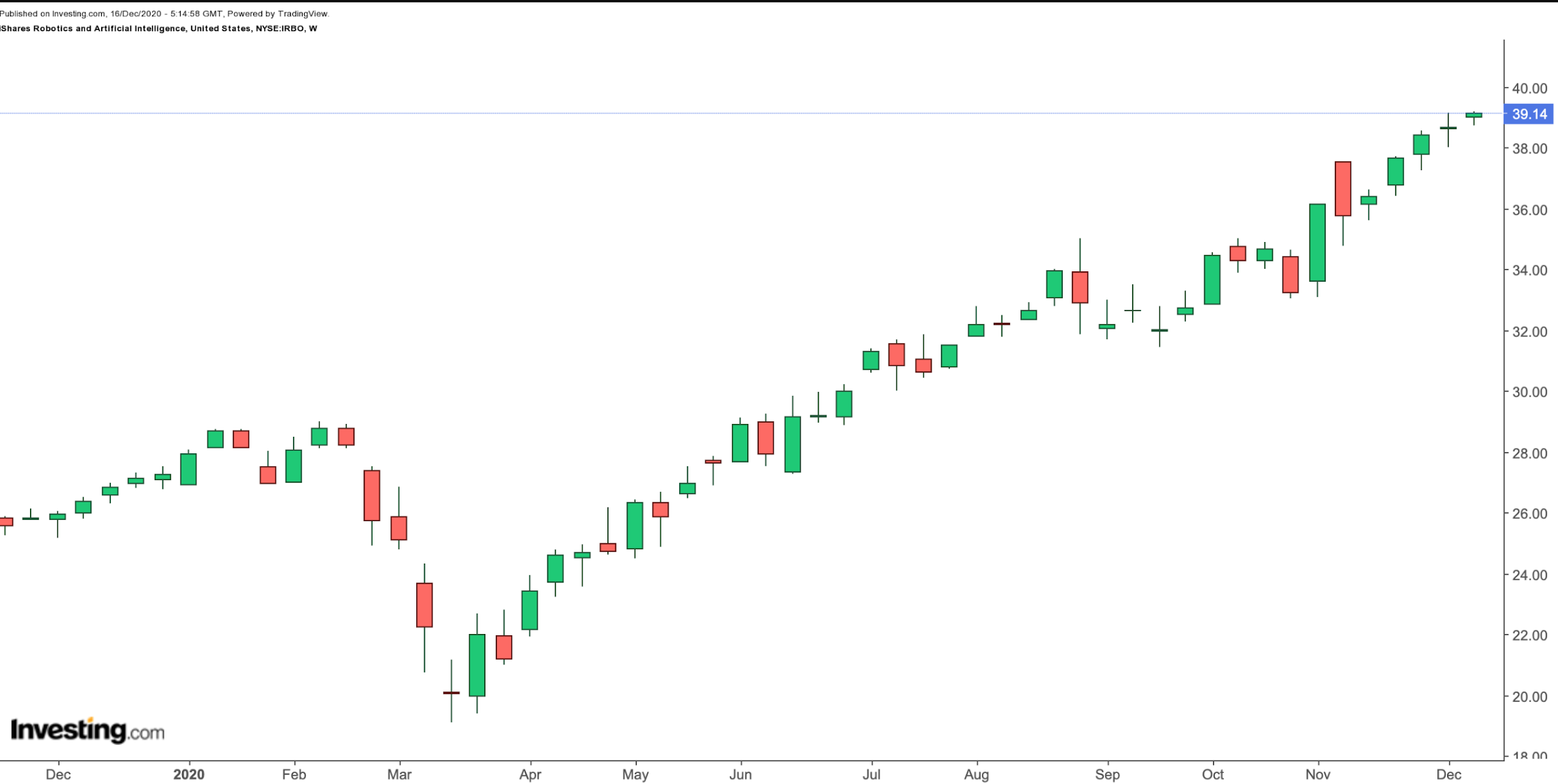Artificial Intelligence (AI) focuses on creating technology and machines that can replicate human behavior.
Recent research led by Stefano Puntoni of Erasmus University, Rotterdam, Netherlands, highlights:
"Artificial intelligence (AI) helps companies offer important benefits to consumers, such as health monitoring with wearable devices, advice with recommender systems, peace of mind with smart household products, and convenience with voice-activated virtual assistants."
We can see examples of this technology around us every day. Digital personal assistants such as Siri by Apple (NASDAQ:AAPL) or Alexa by Amazon (NASDAQ:AMZN) have put AI in our hands and homes.
When Netflix (NASDAQ:NFLX) recommends movies, that's AI at work. Ride-hailing applications like Uber Technologies (NYSE:UBER) or Lyft (NASDAQ:LYFT) also utilize AI.
Elon Musk, CEO of electric vehicle giant Tesla (NASDAQ:TSLA), is optimistic about the brand's upcoming self-driving capabilities, which rely on AI. And Cruise, a majority-owned subsidiary of General Motors (NYSE:GM), has also been using the technology in its fully driverless cars in San Francisco.
The Council of Europe summarized the various global efforts using AI in the fight against COVID-19 and mentioned a range of public companies in a recent article.
Those businesses include Moderna (NASDAQ:MRNA), Baidu (NASDAQ:BIDU), Google's parent company, Alphabet (NASDAQ:GOOGL), IBM (NYSE:IBM), Amazon, Microsoft (NASDAQ:MSFT), Facebook (NASDAQ:FB) and Alibaba (NYSE:BABA), companies that have become household names in recent years.
We previously introduced several exchange-traded funds (ETFs) that provide access to businesses in the AI space, such as the Global X Robotics & Artificial Intelligence ETF (NASDAQ:BOTZ), the ARK Autonomous Technology & Robotics ETF (NYSE:ARKQ) and the Global X Autonomous & Electric Vehicles ETF (NASDAQ:DRIV). Today we extend the discussion to another fund.
AI: The Fourth Industrial Revolution
In a recent presentation at a Ohio State University symposium on Artificial Intelligence and the Future of Tax Law, Robert Kovacev said:
"The effect of the rise of AI and robotics has been described as a "fourth industrial revolution," reflecting the significant impact on the economy and society that is widely anticipated."
Various metrics on AI show its potential influence. According to Statista, the growth of the global AI market in 2019 was 54% and AI's contribution to China's GDP in 2030 will be 26.1%.
For instance, China-headquartered e-commerce giants Alibaba and JD.com (NASDAQ:JD) rely significantly on AI and machine learning, especially during big shopping events like China's Single Day, which we discussed by introducing the KraneShares CSI China Internet ETF (NYSE:KWEB).
Similarly, Walmart (NYSE:WMT), the world's largest retailer by revenue, believes that:
"By experimenting with these new capabilities in our Intelligent Retail Lab (IRL), we’ll explore how to make shopping better now and into the future."
Developments in AI typically lead to a heated debate on how these technologies might replace human labor. Although technological breakthroughs can benefit most of humanity, worry over job losses also become a reality. In fact, since the industrial revolution of the 18th century (or the "First Industrial Revolution," which started with harnessing the power of water and steam), new technologies have usually led to shifts in labor.
For example, Forrester predicts:
"Intelligent automation—the tools including AI and robotics—... will translate to job losses—29% by 2030 with only 13% job creation to compensate..."
“Automation's impact to the future of work will be both sweeping and sensible, but these changes can place unprepared leaders on their heels or put companies in peril."
Finally, a recent Time magazine article on AI points out:
"As automation lets companies do more with fewer people, successful companies don’t need as many workers. The most valuable company in the US in 1964, AT&T, had 758,611 employees; the most valuable company today, Apple, has around 137,000 employees. Though today’s big companies make billions of dollars, they share that income with fewer employees, and more of their profit goes to shareholders."
Therefore, we can expect more headlines on the opportunities and challenges of AI and other disruptive technologies to continue. With that information, let's delve into our ETF.
iShares Robotics and Artificial Intelligence Multisector ETF
Current Price: $39.14
52-Week Range: $19.10 - $39.14
Dividend Yield: 0.89%
Expense Ratio: 0.47%
The iShares Robotics and Artificial Intelligence (NYSE:IRBO) provides exposure to global businesses that could benefit from developments in robotics and AI. It started trading in June 2018.

IRBO, which has 101 holdings, tracks the NYSE FactSet Global Robotics and Artificial Intelligence Index. The top 10 firms comprise around 17% of net assets of more than $255 million.
In terms of sectors breakdown, information technology (54.86%), has the highest weighting, followed by communication (25.77%), industrials (10.86%), consumer discretionary (6.37%) and health care (1.87%).
Close to 55% of the companies come from the US. Next in line are China (15.03%), Japan (10.35%), France (4.26%) and South Korea (4.16%), among others.
Visual discovery engine Pinterest (NYSE:PINS), supplier of test systems and position sensors MTS Systems (NASDAQ:MTSC), camera and social media platform Snap (NYSE:SNAP), Xiaomi (OTC:XIACY), which concentrates on smartphones and the Internet, provider of enterprise software platforms MicroStrategy (NASDAQ:MSTR), Nidec (OTC:NJDCY), which manufactures electric motors, and marketing and sales platform HubSpot Inc (NYSE:HUBS) lead the names in the fund.
Year-to-date, IRBO is up around 44% and hit a record high in early December. Since late October, the fund has returned well over 20%. Short-term profit-taking could therefore be around the corner in many of the names that make up the ETF. A potential decline toward $35 would improve the margin of safety for buy-and-hold investors.
